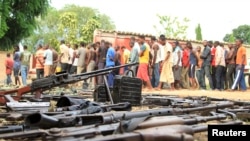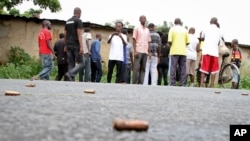Uganda’s President Yoweri Museveni aims to jumpstart fresh peace negotiations between the government of Burundi and opposition groups in Kampala on Monday.
Backed by the East African Community and the United Nations Security Council, the peace talks are aimed at restoring peace and security in Burundi following months of violence in the capital, Bujumbura and other parts of the country.
It is not clear if participants will discuss a proposal from the African Union Peace and Security Council to deploy up to 5,000 peacekeepers in Burundi to help protect civilians.
The African Union has reportedly assured Burundi that it has no ulterior motive in its proposal.
But on Saturday, thousands of Burundians demonstrated against the AU’s proposal through protests led by Vice President Gaston Sindimwo. Sindimwo says Burundi's army is capable of halting violence and protecting Burundians regardless of their political affiliations.
Burundian Foreign Minister Alan Nyamitwe says the government in Bujumbura will not go against the will of the people and their strong opposition to the proposed AU peacekeepers.
Burundi has seen continuous unrest since President Pierre Nkurunziza announced in April that he would seek a third term, defying critics who said the move was unconstitutional.
At least 87 people were killed in fighting earlier this month when gunmen assaulted three military installations in Bujumbura.
In a telephone interview with VOA on Sunday, Nyamitwe, who was on his way to Kampala for the talks, said those who attacked government security forces with the aim of destabilizing the country should be excluded from the peace talks.
“We believe that this is the time to resume the talks from where it stopped and allow all the political stakeholders who I believe would have to be peaceful as has been recommended by the Security Council, to resume dialogue," Nyamitwe said.
"That means that all those people who before the election, have gotten involved in sabotage activities, into coup d'etat, into violent extremism, which has manifested itself through the attacks on the government forces, all of those people should not find themselves around the table," he said.
Nyamitwe said there is a need for all the groups taking part in the talks to demonstrate their commitment to achieving peace.
“We have to be very clear also that if anybody wants to reach some political goals, they cannot go through rebel forces. That is exactly the opposite of what [UN] resolution 2248 calls for,” Nyamitwe said.
“It has to be clear also that no other strategy aiming at [attaining] power through force will be accepted in the country. Once we agree on those principles, then we can start to prepare for [the] next election.”





